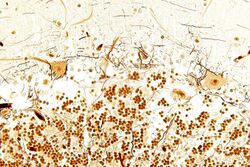Biology:Bielschowsky stain
From HandWiki

The Bielschowsky technique is a silver staining method used in histochemistry for the visualization of nerve fibers,[1] including multipolar interneurons in the cerebellum.[2]
The method is attributed to German neurologist and neurohistologist Max Bielschowsky (1869–1940),[3][4][5] who made improvements over the previous method developed by Ramon y Cajal (1852–1934).[6]
See also
References
- ↑ Susan Standring (2008-01-01). Gray's Anatomy: The Anatomical Basis of Clinical Practice, Expert Consult - 40th Edition. https://archive.org/details/GraysAnatomy40thEd_201403.
- ↑ ""Hairy baskets" associated with degenerative Purkinje cell changes in essential tremor". J. Neuropathol. Exp. Neurol. 69 (3): 262–71. March 2010. doi:10.1097/NEN.0b013e3181d1ad04. PMID 20142764.
- ↑ Stahnisch, F. W. (2014-10-28). "Max Bielschowsky (1869–1940)" (in en). Journal of Neurology 262 (3): 792–794. doi:10.1007/s00415-014-7544-z. ISSN 0340-5354. PMID 25346063.
- ↑ Gray's Anatomy- The Anatomical Basis of Clinical Practice, Expert Consult- 40th Edition.
- ↑ Stahnisch, F. W. (2014). "Pioneers in Neurology". Journal of Neurology 262 (3): 792–794. doi:10.1007/s00415-014-7544-z. PMID 25346063.
- ↑ Enersen, Ole Daniel. "Max Bielschowsky". Who Named It. http://www.whonamedit.com/doctor.cfm/907.html.
 |
